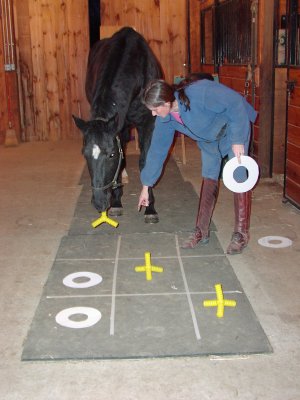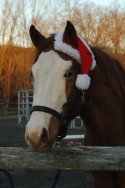|
EQUINE CLICKER TRAINING..... using precision and positive reinforcement to teach horses and people |
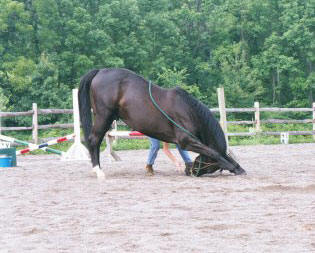
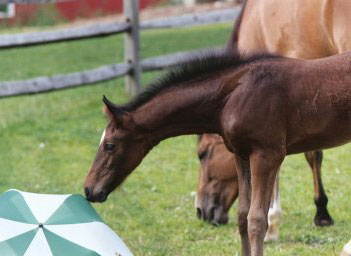
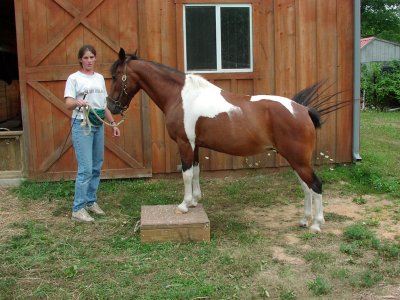
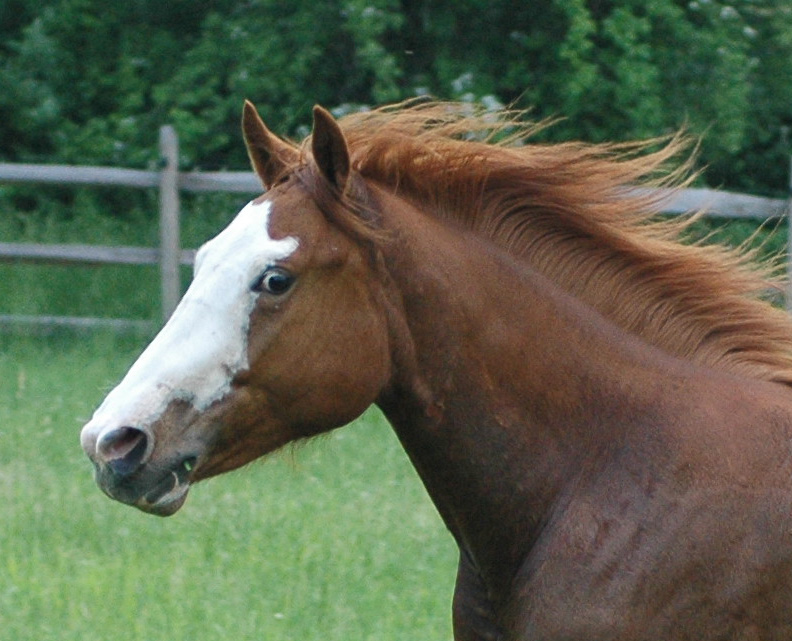
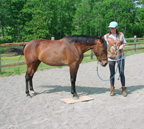
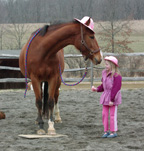
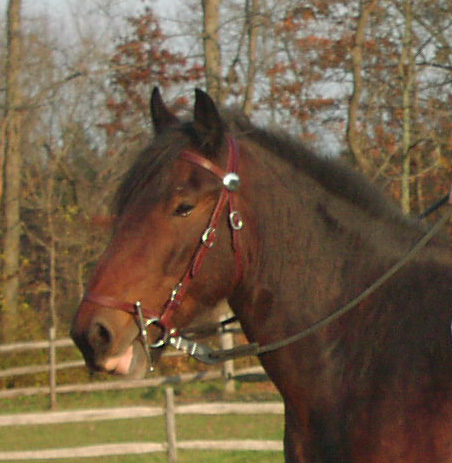
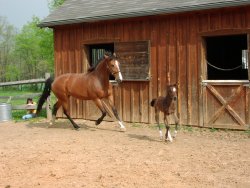 |
|
|
Articles I have moved all the articles to my wordpress site. You can get to them through the links or you can go to the ARTICLES page on www.equineclickertraining.wordpress.com and find them there. Most of these articles were written by me (Katie Bartlett), but some have been contributed by other clicker trainers. I have grouped them by category (alphabetically). If you are new to clicker training, you will want to start by reading the articles under CLICKER BASICS, FAQ, and GETTING STARTED. Those articles are also available here if you scroll down, or you can get to them from the sidebar menu. I wanted to have all the articles in one place, but also offer suggestions for what to read first which is why I organized it this way. ABOUT THE SITE (these articles are also available from the sidebar menu) About the Site - A little information about the reason for the site, how it is organized and about me (Katie Bartlett) How I Found Clicker Training - If you are curious about how I got started clicker training, here is the story of how I learned about it. Why Clicker Training? - Are you considering clicker training? In this article I share some of the reasons why I like clicker training and what makes it different from other training methods. Thank you Mr. Rogers - Mr. Rogers (of the children's television show) passed away soon after I started clicker training. I read an article about him in the newspaper one morning and it prompted me to write this post to the clickryder list. ADVANCED TRAINING (beyond the first stages of getting a behavior) Should you click offered behaviors? A look at stimulus control. Clicker trained horses love to offer behaviors off cue and it is one of their charms that they are so enthusiastic, but should you click offered behaviors? Is it possible to click offered behaviors without losing all stimulus control? Here is a look at how offered behavior fits into the structure of training and how to decide whether or not to click. (April 2007) Duration: Training Strategies and how to develop duration in the clicker trained horse An in-depth look at duration in the clicker trained horse. What is duration? How can I train a horse to keep doing the same behavior for longer. How to Interpret and Manage Energy, Excitement and Tension. Some thoughts on how to handle energy and emotions in our horses. If you feel like your training is being controlled by your horse's mental state and energy level, this article may give you some ideas for addressing that. (March 2007) Taking Clicker Training From the Classroom to "Real Life." This article explains how to make the transition from teaching a behavior to using a behavior. It is great for anyone who has a basic understanding of clicker training but uses it in a limited way or for anyone who wants to expand their use of clicker training into other interactions with their horse. (February 2014). Getting Started with Riding: Handling and Delivering Food. Anwers to some common questions about how to handle and feed from the saddle as well as information about how to prepare your horse so he is comfortable taking food from someone in the saddle. (March 2015) Getting Started with Riding: Common Questions. A follow-up to the previous article on handling food. This one covers topics related to stopping for food, clicking behavior and how to work toward more advanced training. (March 2015). ALEXANDRA KURLAND (Articles about her work) Please note that I've moved these articles to my wordpress site. You can access them through the links below or through the "website" option on the ARTICLES menu on the other site. Clinic Reports: About Clinics: Clinics are important. They provide feedback, inspiration, networking, and good visuals for Alexandra Kurland's exercises. If that is not reason enough for you to think of attending a clinic, you can read here why I attend clinics. Clinic Reports from 2006-2008 - these were written mostly by me and are from the advanced clinics in Groton, NY plus a few others. Micro-Riding posts from Alex: Micro-riding was the clinic theme for 2008. If you read the clinic reports from that year, they reference these posts of Alex's which she has given me permission to include here.
Loopy Training: Instead
of writing regular clinic reports in 2009, I wrote
this post in the fall describing Loopy Training which was the theme of
the 2009 clinics. Alexandra Kurland Advanced Clinic: Groton, NY, May 2011. I posted these notes on facebook instead of writing a formal report. I have collected them all here so it is easier to read. Alexandra Kurland Advanced Clinic: Groton, NY, August 2011. I took Red to this clinic where we looked at Hip Shoulder Shoulder, neck ropes, energy, keeping the horse forward, and acting. Alexandra Kurland Advanced Clinic: Groton NY, August 2012. I posted some notes on facebook instead of writing a formal report. The notes cover topics such as food delivery, clicker compatible tools, and rope handling. Single Rein Riding: Connecting SRR (single rein riding) to traditional cues: moving the shoulders. An explanation of how to use single rein riding to teach your horse to turn while remaining balanced and light Single Rein Riding: Practical applications and integration with work on two reins: A look at how I use single rein riding as both a teaching tool and as part of my every day riding. (September 2007, Katie Bartlett) An Overview of the Training Progression from Groundwork to Riding Using Alexandra Kurland's Rope Handling and Single Rein Work: A look at why the rope handling and single rein work are important, how you get from groundwork to riding and what you can incorporate along the way. Foundation Lessons (the six AK foundation lessons are targeting, head down, backing, happy faces, matwork, and grown-ups.) Look under "GETTING STARTED" for articles on targeting. Ways to Play with the Foundation Lessons: Head Lowering - A list of more advanced exercises or variations on head lowering that you can use to improve your horse's head lowering skills. (Nov 2012) Ways to Play with the Foundation Lessons: Mat work - A list of basic and advanced exercises or variations on mat work that you can use to teach your horse some practical skills and improve his understanding of cues and shaping. (Nov 2012)
Value of
Mat work by Margaret Leach
Clicker Expo is a 3 day teaching and training workshop put on by Karen Pryor's clicker training organization. The event usually happens twice a year, once on the west coast (usually in January) and once on the east coast/midwest (usually in March). For more information on Clicker Expo for this year, visit Karen's web site which is www.clickertraining.com. I have been lucky enough to attend a number of Clicker Expos and each time I wrote up a report on what I learned. The reports are intended to provide some information about what is new in clicker training as well as share some information that I found useful. My goal is not usually to explain something in its entirety, but to provide some food for thought and let people know about the faculty and what they do, as the faculty are a useful resource. Many of them have books and DVDs available. Clicker Expo 2006 - This was the first one I attended in Rhode Island. I don't seem to have a report for it, but I might have sent it to one of the groups. If I can find it, I'll add it here. Clicker Expo 2007 (this is a general report about sessions on targeting, modifier cues, tai-chi rope handling, using research as a clicker trainer, common "speed bumps" encountered in learning clicker training and advanced training tools). Clicker Expo 2008 (sessions on conditioning secondary reinforcers, backchaining, cue control, poisoned cues, broken clicks, TAGteach and guide dogs) Taking Clicker Expo Back to the Horses: this was written a few months after Clicker Expo 2008 and shares how I tried to apply what I learned at Clicker Expo to my own work with my horses. Clicker Expo 2009 (using non-food reinforcers, obedience, broken clicks/reinforcer delivery, neuroscience of clicker training, puppies, freestyle with dogs, fine tuning your skills (mechanics and food delivery), backchaining, and developing training plans) Clicker Expo 2010 (I didn't write this one up as individual sessions, but the report deals with the elements of clicker training (the marker signal, food delivery, reinforcement and training strategies). Clicker Expo 2011 Topics include aggression, anticipation, microshaping, using play to teach self control and super skills (Kay Laurence), working with vets, behavior chains, generalization, and improving your observation skills. Ken Ramirez: July 2012. I attended a two day seminar with Ken Ramirez and shared some of what I learned on facebook. This article is a collection of those notes. Ken Ramirez is on the Clicker Expo faculty so some of the material is similar to or complements that in the Clicker Expo notes, which is why I listed this article here. Clicker Expo 2013: Topics include myths, missteps and mantras, connected walking, cues and context, respodent vs. operant conditioning, negative reinforcement, teaching, and Dr. Susan Friedman. Clicker Expo 2014: Topics include extinction, resurgence, aggression in puppies, combining classical and operant conditioning, default behaviors, practicing, strategic food delivery, fine slicing, performance prep (foundation behaviors), using reinforcement to get rid of unwanted behavior and training for its own sake (not for performance goals). Reward Ends, Then What?: These are my notes on Eva Bertilsson and Emelie Johnson Vegh's talk on the importance of what happens after the reward. This lecture was given at Clicker Expo 2015 but I viewed it as a Clicker Expo video session. FAQ (this article is also available from the sidebar menu) Frequently Asked Questions - answers to some common questions that new clicker trainers often have. They cover topics such as what to use for treats, where to put them, how to use clicker training under saddle, polite treat taking and more... FOALS Clicker Training Foals to Halter and Lead by Barbara Ray - do you have a new foal you would like to start with clicker training? Barbara has many years of experience teaching foals basic handling skills in a gentle and positive way. She explains how to teach your foal about pressure and release and how to follow your feel. Zan's story: This is the somewhat humorous account of Rosie's foal from birth to 18 months. There is some training information mixed in, but it is not intended to be used as detailed instructions. There are separate pages for each month. This link takes you to the first one. GENERAL TOPICS Biting Solutions by Arlene Colon. Why do horses bite? How can we encourage better manners through clicker training? Arlene shares what worked for her when she was having trouble with her horse nipping during training. Food for Thought: "On Babies and Horses" and "You Get What You Click" - 2 short articles Happy New Year 2009: An update I posted in January 2009 describing what I had been doing with my own horses. Measuring our Progress by Melissa M. - What can you do in a year with a horse that isn't ready to ride? Melissa looks back at all the things she has taught her mare Ruby. A great resource for those of you with young horses to show how all those little training sessions add up. The Nudge: Stella offers some insight into how we interpret what our horses do. Putting Our Heads Together: Why you should spend time making sure your horse is comfortable having his head handled. Winter exercises or what to do when you canít ride Ė It is 10 degrees and you are stuck in the barn with the use of a stall and 30 feet of aisle. What do you do? Well, there's a lot. Here are some ideas for things to teach, ranging from fun tricks to improving behavior for worming, bridling, shots etc.. This is mostly a list of ideas with some instructions for selected items. I will add more instructions as I have time GETTING STARTED (these articles are also available from the sidebar menu) Getting started - How do you actually get started with clicker training? A description of three common ways to introduce the clicker and get started. Targeting Handout - This handout answers questions such as what is a target? What you can you do with targeting? Katie Bartlett 2011. MECHANICAL SKILLS
Improve Your Clicker Training
Skills: suggestions for ways to supplement your clicker training time with
other activities that will make you a better clicker trainer. A good list
for things to do in the winter if you can't get out and train (September 2009).
OPERANT CONDITIONING IN THEORY AND PRACTICE Part 1:
Operant conditioning: an introduction for
clicker trainers.
This article focuses on the more theoretical side of clicker training and how it
relates to operant conditioning. It contains an explanation of the
terminology mixed with some real life examples. If you wonder if clicker
training is all positive reinforcement or how to integrate clicker training into
an existing program, this article should give you some answers. (March 2009). Part 2:
How to use Negative Reinforcement as a
clicker trainer: This is the second in a series of articles on the more
theoretical side of clicker training. I suggest you read the 4 quadrants
article first if you are not familiar with the 4 quadrants of operant
conditioning. (May 2009). Part 3:
Thinking Outside the Box:
Tips on capturing, shaping and
getting your horse to offer behavior using +R. This is the third and final
article in the series on clicker training and operant conditioning (Feb
2010).
Intrinsic vs. extrinsic motivation: A few notes from Inge
Teblick's Theory of Fun course where she talks about the differences
between intrinsic and extrinsic motivation. ORCA
The Art and Science of Animal
Training Conference 2012. In March 2012, I attended this
one day conference and this articles has my notes and comments on
the material presented.
The Art and Science of
Animal Training Conference 2013. This year's conference
was on February 2 and the speakers included Dr. Susan Schneider, Bob
Bailey, Phung Luu, Steve White, Alexandra Kurland, Kay Laurence and
Ken Ramirez.
The Art and Science of
Animal Training Conference 2014. This year's conference
was on March 22, 2014. The speakers were Dr. Jaak Panksepp, Bob
Bailey, Phung Luu, Steve White, Alexandra Kurland, Kay Laurence and
Ken Ramirez.
The Art and Science of
Animal Training Conference 2015. This year's conference
was on March 14, 2015. The speakers were Dr. Stanley Weiss, Bob
Bailey, Phung Luu, Steve Aibel and Al Kordowski, Steve White,
Alexandra Kurland and
Ken Ramirez.
Conference reports from 2016 were posted as blogs on my wordpress
site,
www.equineclickertraining.wordpress.com. You can find them under
the BLOG or ARCHIVES tabs. PRACTICAL ARTICLES (HOW TO) Ways to use cones in liberty or lunging work - Most of us use cones to mark places for the rider or handler, but how about teaching your horse to respond to the placement of cones. Here is the story of how I started using cones in round pen work and ended up being able to use cone gates to exercise my horse at liberty in an assortment of patterns and at different gaits. RESCUE AND REHAB WORK Stella: an introduction and overview of training the latest member of the Bartlett herd. Stella came from a rescue and needed some training. Using clicker training for neurological rehabilitation of a horse by Margaret Leach - We all know that clicker training is great for working through aggression and fear issues and for teaching fun new skills, but what about using it to help a horse overcome a serious medical problem. Margaret's mare Serena suffered a severe neurological problem, so severe that she could barely walk in a straight line. Here is the story of her illness and how Margaret used clicker training to help Serena relearn how to organize her own body to become rideable again.
Home | Articles | Community | FAQ | Getting Started | Horse Stories | Links | Photos | Resources
|
